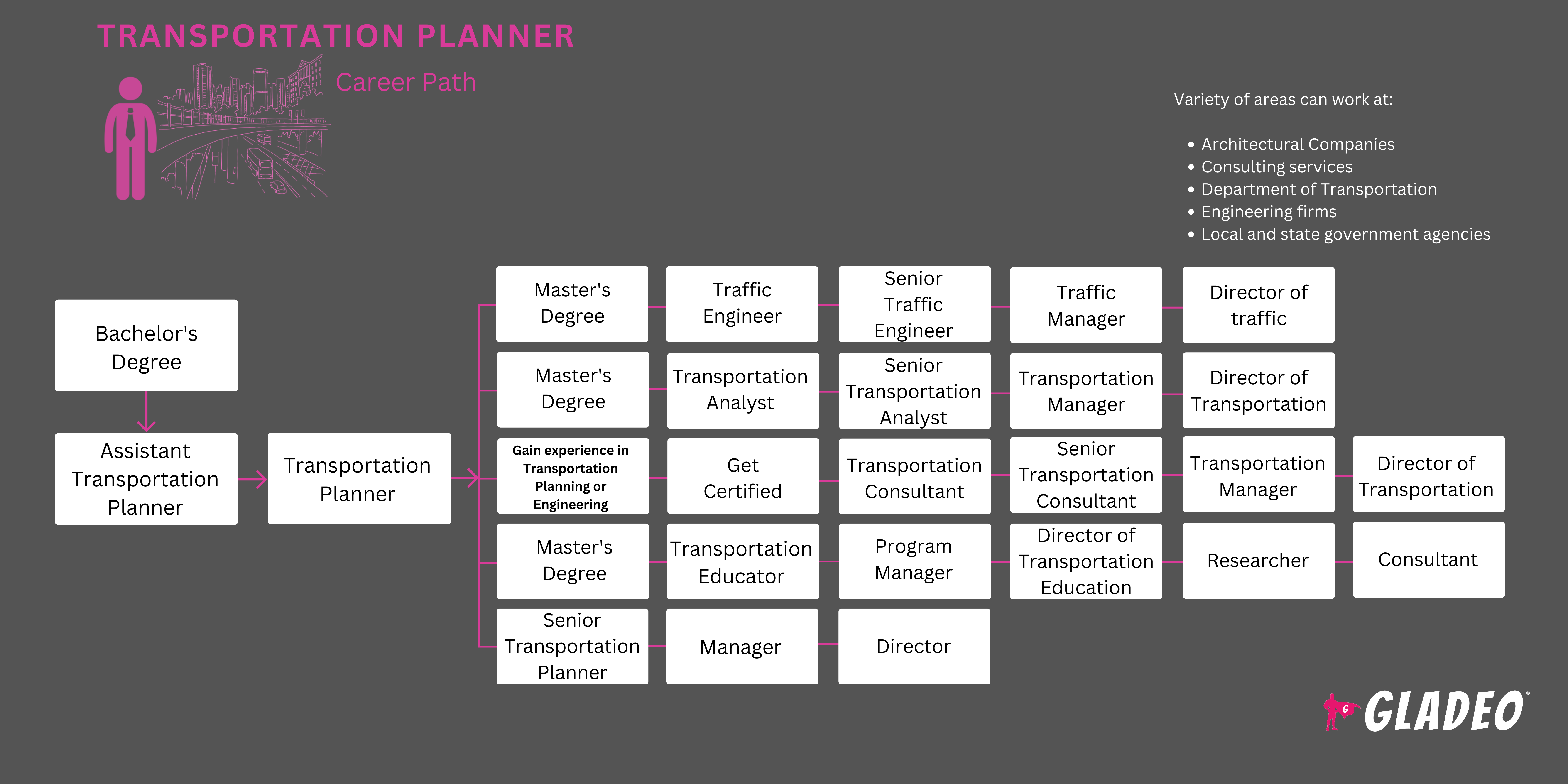스포트라이트
Planner, Transportation Analyst, Mobility Planner, Transit Planner, Transportation Analyst, Traffic Engineer, Transportation Coordinator, Transportation Specialist, Sustainable Transportation Planner, Regional Planner
The world is a hectic place, with people constantly on the go and a million things being transported from one location to another at any given moment. We’re so used to all of these happenings that we rarely stop to think—who’s planning all of the routes and roads being used?
Luckily, there are masterminds working behind the scenes to ensure that pedestrians and vehicles have safe paths to follow along their myriad destinations. They’re called Transportation Planners and it is their job to review studies, collaborate with government agencies, and develop transportation models and simulations that work for as many people as possible. They may specialize in transportation systems such as public transport, highway maintenance, and air travel management.
Transportation Planners are accountable for soliciting feedback and answering questions from the public and various interested parties, which is why they must be expert communicators who work well with others!
- Helping to plan transportation routes to meet local, state, and federal goals
- Ensuring corridors for food, supplies, and other goods to travel from their points of origin to their destinations without delay or undue impact on the environment
- Indirectly (or in some cases directly) contributing to public safety, public health, and the overall economy
근무 일정
- Transportation Planners work full-time, with overtime needed in some cases for meetings or shift work. Travel is often necessary for site visits.
일반적인 업무
- Discuss projected transportation route needs and problems with engineers and applicable stakeholders
- Perform research and review surveys to assess existing infrastructures and transportation systems
- Assess the potential for improvements. Plan out proposals for new projects and renovations
- Review budgets and provide feasible cost estimates
- Consider the potential impacts of project development on residential areas and the environment
- Use traffic modeling software and geographic information systems to generate transportation flow pattern simulations and analyze congestion points
- Collaborate with engineers, including transportation modeling specialists, to analyze or resolve complex design issues and ensure compliance with regulations
- Engage the public to gather feedback and share information through hearings, meetings, surveys, and other forms of communication
- Draft written plans, reports on findings, and permits
- Stay on top of relevant policies related to land use and environmental impact
추가 책임
- Utilize pedestrian and vehicle traffic counting programs
- Speak on behalf of legal jurisdictions in relation to land development
- Update boundary and roadway classification data, as needed
소프트 스킬
- Analytical
- Budget-conscious
- Coordinating and instructing activities
- Organizational skills
- 리더십
- Objectivity
- 환자
- Practical
- Resourcefulness
- Sound judgment and decision-making
- Strong communication skills, including active listening and negotiation
기술 능력
- Corridor planning
- Familiarity with safety and environmental issues related to land use
- Familiarity with traffic and transportation software such as CORSIM, VISSIM, Cube Voyager, and TransCAD
- Infrastructure analysis
- Knowledge of arithmetic, algebra, calculus, geometry, and applied statistics
- Understanding of applied engineering science and technology related to goods and services production
- Understanding of transportation planning policies and applicable laws
- Architectural companies
- Consulting services
- Department of Transportation
- Engineering firms
- Local and state government agencies
Transportation Planners often work on massive-scale projects that can impact millions of pedestrians, transportation users, local citizens, businesses, and the environment for decades to come. Suffice it to say, such projects must be thoroughly planned out in collaboration with numerous other team members, and all potential issues sorted before work begins.
Garnering public feedback and concerns is critical, as is staying in compliance with applicable regulations and taking long-term environmental impacts into consideration. Not all projects will be popular, and some may even be controversial, leading to legal challenges. Thus, Transportation Planners should be expert communicators who can stay flexible and listen to the concerns of the public.
The world’s getting more crowded quickly, with the population rising from 2.5 billion in 1950 to almost 8 billion in 2023. At the current pace, Earth could have 11.2 billion people living on it by 2100! With so many people working, driving, riding buses, parking cars, and flying in planes, Transportation Planners must strive to plan out corridors and other areas able to handle today’s needs as well as ones in the future.
State and federal pushes to lower greenhouse gas emissions are leading the transportation industry to seek ways to reduce vehicle traffic on the roadways. The idea of mobility-as-a-service (MaaS) is aimed at reducing the need for every individual to own a car, and states may try to incentivize users by creating MaaS lanes similar to high-occupancy vehicle (HOV or “carpool”) lanes.
Transportation Planners work well on teams and are great communicators. These skills may have been honed through early school activities and involvement with extracurricular groups. They might have shown a general interest in design or architecture and the behind-the-scenes of how towns and cities function. Many have always been attuned to environmental issues and could have wanted to be involved with public works in a way that decreases harmful impacts on the planet.
- 75% of Transportation Planners have a bachelor’s degree; 25% have a master’s, per O*Net
- The most common undergraduate degree majors are logistics, civil engineering, urban planning, geography, architecture, and environmental science. Grad students can then go on to earn a Master of Science in Transportation Planning
- Sample course topics may include:
- Budget development and financing
- Grant programs
- Land use planning
- Legal matters
- Mass media communication
- Policy creation
- Public administration
- Statistical research
- Transportation engineering
- There are also undergrad certificates in Transportation Planning, to boost your credentials for those who don’t want to finish a master’s but need some specialization courses in transportation planning
- Optional third-party certifications are also available, such as:
- American Institute of Certified Planners’ Certified Transportation Planner
- Green Business Certification Inc.’s LEED AP Neighborhood Development
- International Parking Institute’s Certified Administrator of Public Parking
- National Association for Pupil Transportation’s Pupil Transportation Specialist
- Oracle’s SCM Transportation and Global Trade Management Cloud 2021 Certified Implementation Specialist Certification
- If majoring in a STEM field, it is typically advisable to attend a program that has been accredited by ABET
- Note, ABET is accreditation is voluntary. Some of the top schools don’t bother with it because they already have an established reputation of excellence. However, some of the worst programs don’t attempt to get ABET accreditation because their curriculum would never pass the strict standards of quality
- Consider the cost of tuition, discounts, and local scholarship opportunities (in addition to federal aid)
- Check out graduation rates and post-graduate job placement statistics
- Think about your schedule and flexibility, when deciding whether to enroll in an on-campus, online, or hybrid program
- Transportation planning requires numerous STEM skills, so study hard in arithmetic, algebra, calculus, geometry, applied statistics, engineering science, and technology
- You’ll need strong communication skills, too, so get practice with public speaking, debate, negotiation, and teamwork through relevant classes, clubs, extracurricular activities, and volunteerism
- Learn about finances and budgeting by serving as a treasurer for clubs in school
- Read articles and watch videos related to transportation projects, including how they are proposed, planned, and implemented
- Planetizen’s YouTube channel features a free 16-video “course” all about Transportation Planning!
- Do research on your local town or city’s public works web pages. Check their online calendar for upcoming public events you can attend, so you can hear the topics discussed and the general public’s feedback
- Contact a local Transportation Planning worker to request an informational interview or to ask if you can shadow them at work for a few hours
- Look for internship opportunities in public works offices where you can gain exposure to the “behind-the-scenes.” Some degrees feature such internship requirements built into their program, but if not, you may find something on Indeed.com. Your internship does not have to be tied to a college program
- Keep track of all your work and academic accomplishments for your resume

- Having a strong mix of practical, relevant work experience and academic credentials is vital to breaking into a Transportation Planning career
- Many Transportation Planners start out in other public works roles. These types of jobs can help you gain experience engaging with the public, city or state planning officials, and project managers
- A bachelor’s in logistics, civil engineering, urban planning, geography, architecture, or environmental science can qualify you for many positions. However, holding a master’s in transportation planning or a closed-related specialty can likely qualify you for more and better jobs!
- Apply for open positions found on popular job boards such as Indeed.com, as well as specialty boards such as the ones on Transportation.org, Jobs in Logistics, the National Association of City Transportation Officials, and TransitJobFinder
- Stay connected to your network and ask for leads on upcoming job openings. Most jobs these days are found through connections!
- You’ll need personal references when it comes time for job interviews. Ask previous teachers and supervisors if they’d be willing to be listed as references
- Review sample Transportation Planner resumes
- Conduct mock interviews with friends or your educational program’s career center staff, if offered
- Learn how to dress for a teacher interview
- Depending on your position, there may not be a lot of room for advancement, so you might have to consider switching employers to move up
- Let your supervisor know early on that you will focus on doing the best job you can in your current role, but also wish to plan ahead for promotions
- Ask their advice about what additional certifications or education could help with that goal
- If you have a bachelor’s, consider doing a master’s or a certificate to specialize further in your field. When eligible, knock out a third-party certification such as:
- Green Business Certification Inc.’s LEED AP Neighborhood Development
- Transportation Professional Certification Board’s Professional Transportation Planner
- Collaborate effectively with engineers, city officials, project managers, and attorneys
- Establish your reputation as a person of integrity. Build trusting relationships with the public groups you engage with
- Stay on top of updates to the traffic and planning software you use and any other technological advancements or trends in the field
- Continuously review applicable local, state, and federal policies or laws that impact transportation planning and land use
- Study transportation industry magazines, like the American Journal of Transportation
- Join professional organizations, attend events, give lectures, and grow your network!
웹 사이트
- American Association of State Highway and Transportation Officials
- 미국 공인 플래너 협회
- American Journal of Transportation
- 미국 기획 협회
- American Public Transportation Association
- American Public Works Association
- American Society of Civil Engineers
- American Society of Highway Engineers
- Green Business Certification Inc.
- International Parking and Mobility Institute
- National Association for Pupil Transportation
- Transportation and Development Institute
- Transportation Research Board
도서
- New Mobilities: Smart Planning for Emerging Transportation Technologies, by Todd Litman
- Roadways for People: Rethinking Transportation Planning and Engineering, by Lynn Peterson, Elizabeth Doerr, et al.
- The Geography of Urban Transportation, by Genevieve Giuliano and Susan Hanson
Transportation Planners work in a critical but relatively small career field. If you’re looking for jobs that may feature a higher number of employment opportunities, consider some of the following similar options!
- 토목 엔지니어
- Environmental Engineer
- Land Surveyor
- Logistician
- Project Management Specialist
- Traffic Technician
- Transportation Engineer
- Transportation, Storage, and Distribution Manager
- Urban and Regional Planner
뉴스피드

주요 채용 정보

온라인 강좌 및 도구








